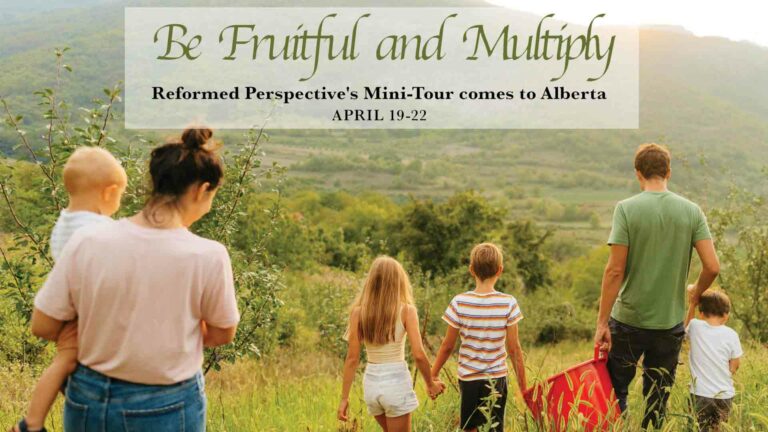On March 11, 2015, Classis Ontario West adopted an unusual proposal from Hamilton’s Providence Canadian Reformed Church: Providence wants an addition made to the Belgic Confession.
As they explain in their proposal, our confessions differ from Scripture in that they aren’t perfect or sacred…so they can be amended or edited. That has happened in the past: for instance, at the 1905 General Synod of the Reformed Churches in the Netherlands a number of words were deleted from Belgic Confession Article 36 “in an effort to better conform to biblical teachings on the role of civil government.”
But why would a change need to be made now? Because “the Canadian Reformed Churches presently face a significant doctrinal challenge in the area of origins.”
What change does Providence propose? They want to replace the first line of the Belgic Confession’s Article 14 with the following to clarify “our confessional and biblical stance on human origins” (new wording is italicized):
We believe that God created the human race by making and forming Adam from dust (Gen. 2:7) and Eve from Adam’s side (Gen. 2:21-22). They were created as the first two humans and are the biological ancestors of all other humans. There were no pre- Adamites, whether human or hominid. God made and formed Adam after his own image and likeness, good, righteous, and holy.
As the proposal notes, many believe that our confessions are already quite clear on this topic. However, the fact is some Canadian Reformed academics have joined together to argue that the confessions leave room for a great diversity of views on how mankind came to be. This group, Reformed Academic, includes some very prominent figures: Dr. Arnold Sikkema, Dr. Jitse Van der Meer and Dr. F.G. Oosterhoff. They have a diversity of views amongst themselves, and it can be hard to figure out just what they each believe about Man’s origins. On the group’s blog they have allowed their most outspoken (and clearest) member, Dr. Jitse Van der Meer, to outline what he considered strong evidence for the possibility that man and chimpanzees have a common ancestor.
Does that mean Dr. Van der Meer is affirming the evolution of man from some relation of chimps? Well, there is a nit that can be picked here: relating strong evidence for evolution is not necessarily the same thing as affirming evolution. As Dr. Sikkema noted in a response to the proposal, even a creationist like Dr. Todd Wood has acknowledged that there are strong evidences for evolution.
But, of course, there is acknowledging and there is acknowledging. While both Reformed Academic and Dr. Wood acknowledge the evidence for evolution only Dr. Wood acknowledges that God created Man over six literal days and not via a process that involved pre-Adamites and millennia upon millennia of death, disease, and disaster, which He thereafter declared “good.” Context is key.
In his response to the proposal Dr. Sikkema argued that Providence Church had misrepresented him in supporting materials by labeling him a “theistic evolutionist”:
I don’t “believe in evolution.” It’s not about belief. I don’t believe in Einstein’s theory of gravity either, but I do believe in a good, loving, and covenantally faithful Triune God…
Dr. Sikkema uses the term “belief” here in the sense of “place my hope in.” In that sense he believes in God, but not evolution or Einstein’s theory of gravity. However, no Christian anywhere “places their hope” in evolution, so if that is what it means to “believe in evolution” it is not surprising Dr. Sikkema rejects the label “theistic evolutionist.” As he has redefined the term it can’t be applied to anyone at all.
But what if we give the term a more reasonable definition? What if we say a theistic evolutionist is “someone who argues that God-directed evolution is a legitimate possibility”? Then the term applies. In a joint blog post (responding to the charge that, “evolution falls outside the tent of the Reformed confessions” Dr. Sikkema and the other members of Reformed Academic wrote:
…God-directed evolution does not exclude the direct creation of Adam, because everything that happens is under God’s direct control. Therefore, theistic evolution is not outside the boundaries of the Three Forms of Unity [i.e. the Heidelberg Catechism, the Canons of Dort, and the Belgic Confession].
Other objections have already been raised, some of note (an edit will be needed to acknowledge that Eve, too, was made in God’s image), but very few of which wrestle with what is at stake here. To paraphrase Douglas Wilson, did Adam bring death into the world (Romans 5:12) or did millions of years of death and dying bring Adam into the world?Providence’s proposal specifically and clearly rejects the latter and calls upon our churches to do the same.
The proposal’s critics are going to fall into one of two camps. There will be:
- Those who argue it isn’t necessary because they believe the Confession already rules out pre-Adamites.
- Those who argue it isn’t necessary but who won’t rule out pre-Adamites.
If the critics all fall into the first camp, Providence’s proposed addition isn’t needed. Conversely, if there are any who fall into the second camp, that will highlight why we need to clarify our Confession.
There will also be some who make a show of being in the first camp with carefully parsed statements such as, “it could be argued that the Confession already rules out evolution.” While that sounds very first camp-ish, it can be a clever way of saying, “some people – not necessarily me, mind you – could argue…” We should view such critics who won’t be clear as strengthening the case for Providence’s clarifying proposal.
Lots of work, research, and thought has gone into Providence’s proposal, and you should read it for yourself. It can be found on their website: ProvidenceChurch.ca.














